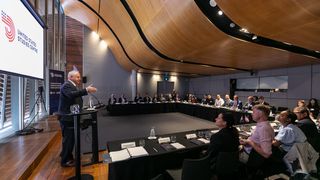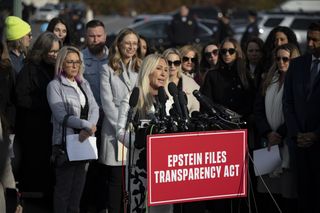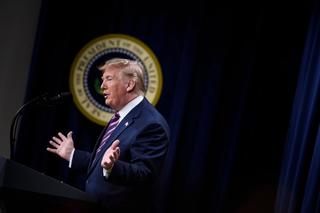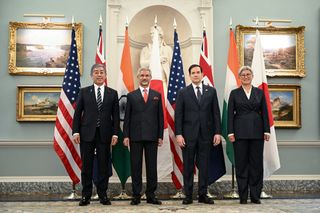On Monday, 13 November, the United States Studies Centre (USSC) at the University of Sydney hosted a roundtable with Minnesota Governor Tim Walz to discuss engaging Australian and US Indigenous Communities in the clean energy transformation.
The roundtable featured a Welcome to Country from Uncle Alan Murray, Chairman of the Metropolitan Local Aboriginal Land Council and remarks from Governor Walz before a roundtable discussion to cover four key questions:
- What are areas to work together and co-invest in the clean energy transformation? What are some clean energy goals for Indigenous Communities in Australia and Minnesota?
- How are Australian and Minnesota/US governments and businesses working to engage Indigenous partners at the national and state level on clean energy issues?
- What are the government funding streams that can support Indigenous clean energy projects in both countries? What are some funding gaps or areas for further economic development?
- How can higher education institutions use their R&D and workforce training programs to support the goals of Indigenous clean energy transformation?
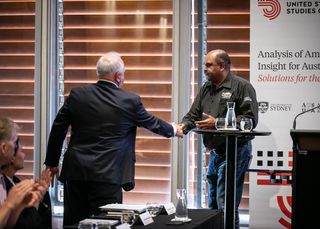
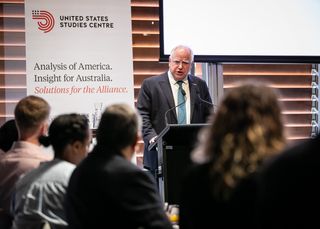
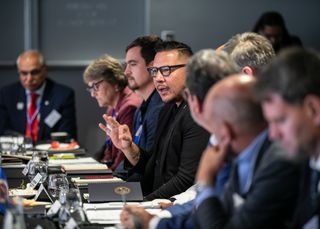
Participants were a mix of government, corporate, NGO, higher education and Indigenous Community representatives from both the United States and Australia. Discussants included:
- Prof. Shahzad Ahmad | Associate Vice President for International Studies, Saint Cloud State University
- Florence Drummond | Executive Director, Development Partnership Institute
- Prof. Renate Egan | Executive Director, Australian Centre for Advanced Photovoltaics & Deputy Head of School (Industry and Engagement), University of New South Wales
- Todd Malan | Chief External Affairs Office & Head of Climate Strategy, Talon Metals
- Joe Nayaquonabe | CEO, Mille Lacs Corporate Ventures
- Richard Neumann | Director of Climate Change Mitigation and Investment Section, Department of Foreign Affairs and Trade
- Yolande Pepperall | Associate Director, Clean Energy Finance Corporation
- Jake Robinson | Chief Development Officer, Red Lake Inc.
- Benson Saulo | Joint Managing Partner, First Nations Capital
- Matt Varilek | Commissioner, MN Department of Employment and Economic Development
- Robbyn Wacker | President, St Cloud State University
- Bhiamie Williamson | Director, Country Needs People
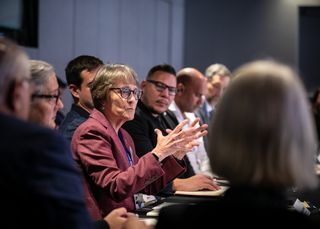
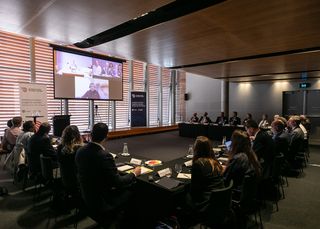
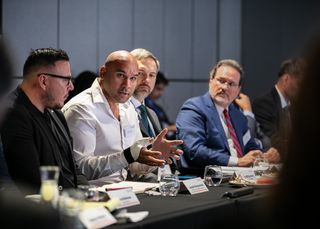
Several themes emerged from the discussion, showing important similarities between the two countries and opportunities to learn from and work together, including:
- Indigenous Communities in both countries are often located in more remote areas and experience relative energy poverty. They are nimble and eager to move quickly on renewables for both energy and economic sovereignty.
- Opportunities to not just be self-sufficient for energy, but to provide renewable sources for neighbouring projects could bring great benefits to Indigenous Communities.
- The clean energy transformation offers the opportunity to realign projects with values of stewardship and multigenerational thinking.
- There is a key difference between meaningful vs performative engagement. Equity and equitable access to opportunities are important.
- The different legal arrangements around land management in the United States and Australia mean there are different approaches to negotiate partnerships.
- Agreements around Indigenous Protected Areas in Australia could align with clean energy industry if Communities want it.
- The Inflation Reduction Act and other measures offer tremendous opportunities for Indigenous Community involvement in clean energy projects, but there are key barriers that need to be addressed including: education and training, workforce capacity building and ensuring Traditional Owners are aware of programs and are supported to access the opportunities.
- Bundling education in all clean energy packages would help ensure the upskilling and capacity building is occurring alongside the projects.
- Involving social sciences (especially law and finance) in clean energy education programs will ensure a more holistic approach to the transformation.
- Blunt instruments around ESG can exclude First Nations people. Early and continuous engagement are important to ensure money that’s available can actually be deployed.
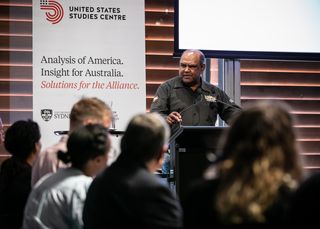
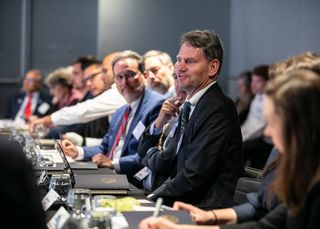
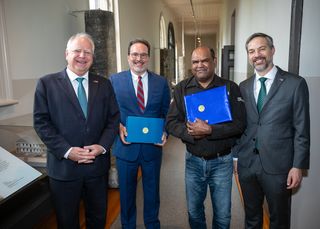
To request a meeting or briefing with the USSC, please email: ussc.media@sydney.edu.au.





